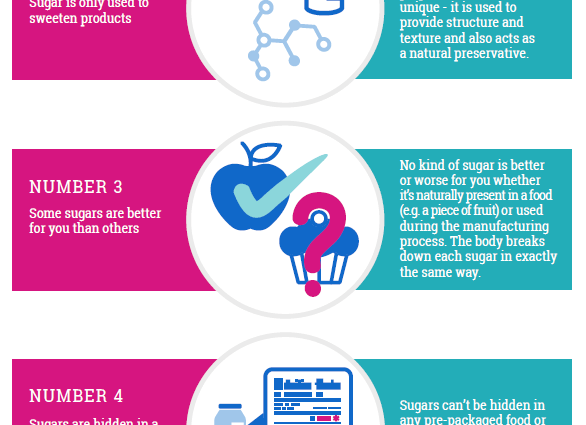Cuprins
Sugar is the greatest murderer of the XNUMXst century. It is a white poison, a drug that leads to addiction. It is highly acidic and robs the human body of vitamins and minerals. It causes hyperactivity in children, is responsible for overweight, leads to cancer, osteoporosis and many other disorders and diseases. It is the greatest enemy of our health. Is it all true? What are the most common myths about sugar?
Shutterstock Vezi galeria 7
- Dieta după fracturi osoase. Cum ar trebui să arate și ce să eviți?
În perioada de convalescență după fractura osoasă, o dietă adecvată are un efect de susținere asupra organismului. Ar trebui să ofere cantitatea optimă necesară în...
- Dieta pentru diaree. Ce să mănânci în diaree?
Diareea este eliminarea fecalelor apoase sau moale de mai mult de trei ori pe zi. Cea mai frecventă cauză a diareei sunt infecțiile virale sau...
- Nutriție pentru prevenirea flatulenței și a gazelor intestinale
Mulți oameni suferă de exces de gaze în tractul digestiv. Ele provoacă senzații și simptome foarte neplăcute, jenante – distensie abdominală, eructații sau...
1/ 7 Brown cane sugar is healthier than white beet sugar
In terms of energy, brown and white sugar are no different. More specifically, brown sugar has slightly fewer calories than white sugar, but the difference is so small that it does not matter in the total consumption. White sugar is produced in the process of the so-called a ration in which undesirable additives are removed from sugar, but unfortunately also vitamins and minerals. Unfinished brown sugar contains some vitamins and minerals, but again this is so minimal that the difference between brown and white is negligible.
2/ 7 Sugar causes tooth decay
Yes, sugar consumed in large amounts contributes to the formation of dental caries. However, sugar is not the only factor here. Caries is caused by the action of bacteria that cover the enamel surface. These bacteria break down saccharides (all – not just sucrose) into organic acids that decalcify the enamel and reduce its density. In most cases, this is due to poor oral hygiene combined with inadequate nutrition. Our teeth can spoil not only from eating sugar, sweets and sweetened drinks, but also from grapefruit, lemon, sour cucumbers, crisps, tea, coffee or red and white wine.
3/ 7 Sugar causes cancer
Certain foods, if consumed in excess, can actually contribute to certain types of cancer. Research results suggest that excessive consumption of sugars may lead to cancerous diseases of the pancreas, colon and anus. These results, however, are not conclusive, so further studies are ongoing.
4/ 7 Sugar leads to diabetes
The name “diabetes” leads to the mistake that sugar consumption can lead to the development of Diabetes mellitus. Meanwhile, this is not true. Scientific research has not confirmed any relationship between eating sugar and the development of the disease. Type 1 diabetes is a genetic disease caused by various environmental factors. The appearance of type II diabetes is favored by overweight and obesity, as well as by overeating in general, and not only with sweets.
5/ 7 Sugar is addictive
Eating sweets evokes a feeling of pleasure and satisfaction. This makes us want to eat them more and more. However, it is not about sugar addiction. Sugar, sweets or other such dishes, to put it simply, do not meet the conditions leading to addiction to substances, the lack of which causes symptoms of withdrawal. Therefore, sugar is not an addictive substance.
6/ 7 It is mainly sugar that causes overweight and obesity
Sugar is certainly not the only culprit in overweight and obesity, but it can contribute to them. The cause of overweight and obesity is not complicated: prolonged intake of excessive amounts of energy, unbalanced energy expenditure. Consuming too much sugar means high energy consumption, but fats are much more harmful to us.
7/ 7 Sugar causes hyperactivity
The claim that the consumption of sugar and sweets makes children hyperactive is very popular with parents who firmly believe this myth. However, this belief is incorrect. The link between excessive sugar consumption and hyperactivity or other behavioral disturbances in children has never been conclusively confirmed by scientific studies.










